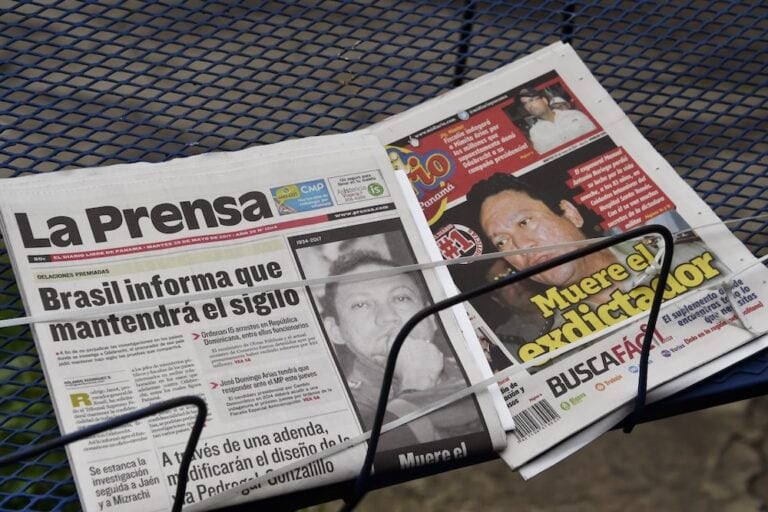After years of being one of the most progressive regions in the world in terms of balanced copyright policy, Latin America is unfortunately sliding into copyright maximalism, enacting increasingly restrictive copyright enforcement measures into their federal laws.
(EFF/IFEX) – After years of being one of the most progressive regions in the world in terms of balanced copyright policy, Latin America is unfortunately sliding into copyright maximalism, enacting increasingly restrictive copyright enforcement measures into their federal laws.
While Chile spent years drafting their broad reform to the copyright system along with civil society groups, and Brazil excitedly discussed the reform of copyright law with unprecedented civil society participation to draft a balanced bill, Colombia and Panama have rushed to write and approve new copyright frameworks with drastic consequences for the digital generation. Why is this occurring? It is the result of top-down, harsh implementation of bilateral free trade agreements (FTAs) with the US, that require nations to enact far more restrictive language than what is found in the US itself.
This is precisely the kind of forum shifting and policy laundering we often blame on the US. But in these cases, Latin American governments should also be held accountable for their own choices.
Panama
Panama, which has had a long history of being susceptible to US political pressure, recently introduced a new copyright bill in order to fulfill the requirements of its FTA with the US. And they did so with no civil society consultation [PDF- Spanish]. Andres Guadamuz from Technollama called the bill, Bill 510, the “worst copyright law in history.” The Bill has been approved by the Panamanian Congress last Wednesday (September 26th), and is now awaiting the President’s signature which realistically could occur at any moment.
One of the major concerns with Bill 510 is that it completely abolishes due process from the proceedings of infringement claims. The law would create an administrative branch called the General Copyright Directorate (DGDA). The DGDA can slap users with an infringement charge and will only allow users 15 days to prove their innocence. Once arrested, they can be fined up to approximately $100k USD for the first offense, and $200k for the second1.
Images protesting the new Panamanian copyright law
The monetary fines from users would not revert to cultural funds or to the copyright holders, but would go into the pockets of the government through the DGDA. Moreover, the public servant that imposes the fine wins a “bonus” of up to 50% of their salary. The absurdity of the law is that the enforcement agency will have the authority to investigate, accuse, assign the penalties, and get the final “revenues” of their work.
This is not only a clear violation of due process, but a system creating a direct incentive for the DGDA to immediately monitor all torrent use in Panama, and identify all people associated with IP addresses to be summoned and fined, regardless of legitimate infringement. Consequently, this law would pose undeniable threats to free speech, by striking fear into all users who share content, while also violating their privacy by enabling a system that allows a government agency to monitor all of their online communications. Nothing about this law is meant to promote new innovation or creative works. It will only produce new bureaucrats who have the authority to criminalize and intimidate Internet users. No other country has given the copyright office this sort of unchecked power before.
The cherry on the cake is that the law extends copyright protection to temporary electronic copies without establishing the necessary exception for the transient copies needed for the Internet to function. The Ministry announces that this law brings Panama to the new digital era, but what this provision could do is hold anyone in Panama liable for simply using the Internet, and even hold ISPs responsible for “cache” files of content that is copyrighted. Such rules are anything but technologically progressive.
While users and digital rights organizations are noting its absurdities, governments and content industry associations commemorate the law. The Minister of Commerce and Industry of Panama, Ricardo Quijano, seemed pleased with Bill 510’s passage through Congress: “[Wi]th the implementation of this new Act, our country [Panama] is being upgraded within the international and global context.”
Referring to Panama’s 1994 copyright law, the US government affirmed that Panama had “an adequate and effective domestic legal framework to protect and enforce intellectual property.” However, they also stated that more could be done to address their concerns over IP infringement, so the US government must now surely be pleased that the Panamanian government plans to commit such a significant amount of its resources to fighting alleged copyright piracy.
During the session that approved Bill 510, the Panamanian Congress said: “…with this bill, the country will count with an appropriate and effective norm for the protection of authors, industry, culture, information, entertainment and telecommunications”.2 In no moment has it mentioned users’ rights or a balanced approach adequate to the digital age, nor proven to generate jobs or wealth for Panamanians.


